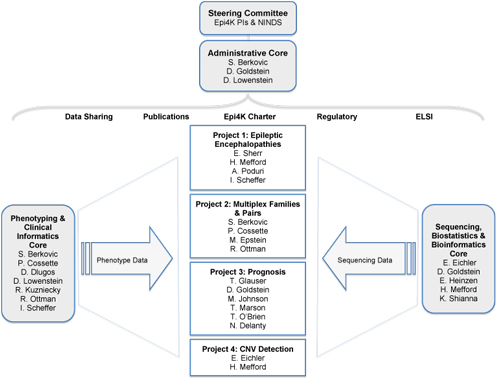About the Epi4K Consortium
Our work is organized into 3 Cores and 5 projects:

Epi4K Cores
The Epi4k Administrative Core oversees and coordinates the activities of all cores and scientific projects. The Phenotyping and Clinical Informatics Core assembles, organizes and validates the phenotypic information on all patients proposed for genomic analysis, and ensures that patients’ DNA samples are available to the Epi4K Sequencing, Biostatistics and Bioinformatics Core when needed. The Sequencing, Biostatistics and Bioinformatics Core will service all of the Epi4k discovery projects by generating the necessary sequence data and prioritizing all genetic variants for validation in follow up cohorts.
Epi4K Projects
In Project 1, 500 patients with Infantile Spasms and Lennox-Gastaut Syndrome will be sequenced to identify genetic causes of these syndromes. Additionally, for a subset of patients their parents will also be sequenced to identify cases in which patients harbor a de novo or rare pathogenic mutation. The Project 2 team will perform whole genome sequencing on families with IGE or NAFE: 1,500 pairs of first-degree relatives, and 300 families with 3 or more individuals. A PMG/PVNH Project will examine up to 250 families with polymicrogyria or periventricular heterotopia. Finally, Project 4 is tasked with inventing new computational algorithms to apply to the genome data generated by Epi4K. The new Project 5 is the functional modeling team, which is developing new models of brains with the mutations/genes discovered by the consortium. Using these brain models, we can understand how the genes affect actual brain behavior, and we can develop new drugs and therapies for epilepsy patients.
Epi4K Institutions
- Duke University
- University of California, San Francisco
- University of Washington
- University of Melbourne
- Emory University
- Columbia University
- University of Montreal
- Children’s Hospital of Philadelphia
- New York University
- Boston Children’s
- Royal College of Surgeons in Ireland
- Cincinnati Children’s Hospital
- Imperial College
- University of Liverpool
Funding
The Epi4K Consortium is supported by 6 grants from the National Institutes of Health, through the National Institute for Neurological Disorders and Stroke:
- U01NS077274 Administrative Core
- U01NS077276 Phenotyping and Clinical Informatics Core
- U01NS077303 Sequencing, Biostatistics, and Bioinformatics Core
- U01NS077364 Epileptic Encephalopathies
- U01NS077367 Whole Genome Sequencing in Multiplex Families and Pairs
- U01NS077275 CNV Detection
Current Members of the Epi4K Consortium
We are working collaboratively to find discoveries in the genetics of epilepsy. We hope that our collaboration will create new understanding of epilepsy and soon, improved treatments for the millions of people with epilepsy around the world.
Our members are organized into 3 cores, 5 projects, and our Project Officers at NINDS:
Administrative Core
- David Goldstein, PhD, Columbia University
- Samuel Berkovic, MD, University of Melbourne
- Dan Lowenstein, MD, University of California, San Francisco
- Mignon Keaton, PhD, Columbia University
Phenotyping and Clinical Informatics Core
- Dan Lowenstein, MD, University of California, San Francisco
- Ruth Ottman, PhD, Columbia University
- Samuel Berkovic, MD, University of Melbourne
- Ingrid Scheffer, PhD, University of Melbourne
- Patrick Cossette, MD, Université de Montréal
- Dennis Dlugos, MD, The Children's Hospital of Philadelphia
- Ann Poduri, MD, Children's Hospital Boston
- Elliott Sherr, MD, PhD, University of California, San Francisco
- Ruben Kuzniecky, MD, New York University
- Catharine Freyer, MBA, University of California, San Francisco
- Kevin McKenna, University of California, San Francisco
Sequencing, Biostatistics and Bioinformatics Core
- David Goldstein, PhD, Columbia University
- Erin Heinzen, PhD, Columbia University
- Evan Eichler, PhD, University of Washington
- Heather Mefford, MD, PhD, University of Washington
- Slave Petrovski, PhD, Columbia University
- Yujun Han, PhD, Columbia University
- Andrew Allen, PhD, Columbia University
- Brian Krueger, PhD, Columbia University
- Elizabeth Ruzzo, Columbia University
- Molly Cook, Columbia University
Project 1: Epileptic Encephalopathies
- Ann Poduri, MD, Children's Hospital Boston
- Dennis Dlugos, MD, The Children's Hospital of Philadelphia
- Elliott Sherr, MD, PhD, University of California, San Francisco
- Heather Mefford, MD, PhD, University of Washington
- Ingrid Scheffer, MD, PhD, University of Melbourne
Project 1: PMG/PVNH Project
- Ann Poduri, MD, Children's Hospital Boston
- Elliott Sherr, MD, PhD, University of California, San Francisco
- Ruben Kuzniecky, MD, New York University
Project 2: Multiplex Families
- Ruth Ottman, PhD, Columbia University
- Samuel Berkovic, MD, University of Melbourne
- Patrick Cossette, MD, Université de Montréal
- Michael Epstein, PhD, Emory University
Project 3: Prognosis
- David Goldstein, PhD, Columbia University
- Michael Johnson, MD, PhD, Imperial College, London
- Tony Marson, MD, University of Liverpool
- Terence O'Brien, MD, University of Melbourne
- Tracy Glauser, MD, Cincinnati Children's Hospital Medical Center
- Norman Delanty, MD, Beaumont Hospital and Royal College of Surgeons, Dublin
Project 4: CNV Detection
- Heather Mefford, MD, PhD, University of Washington
- Evan Eichler, PhD, University of Washington
- Joe Cook, MS, University of Washington
- Candace Myers, PhD, University of Washington
- Ben Nelson, University of Washington
- Archana Raja, University of Washington
Project 5: Functional Modeling
- Steve Petrou, PhD, Florey Neuroscience Institute
National Institute for Neurological Disorders and Stroke
- Katrina Gwinn, MD, NINDS
- Brandy Fureman, PhD, NINDS
- Randall Stewart, PhD, NINDS
